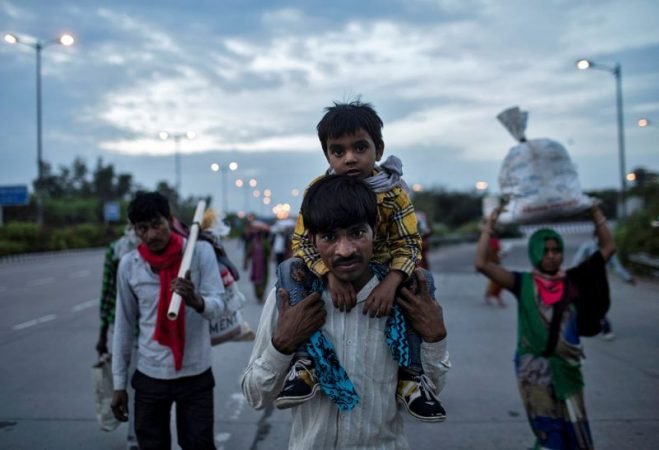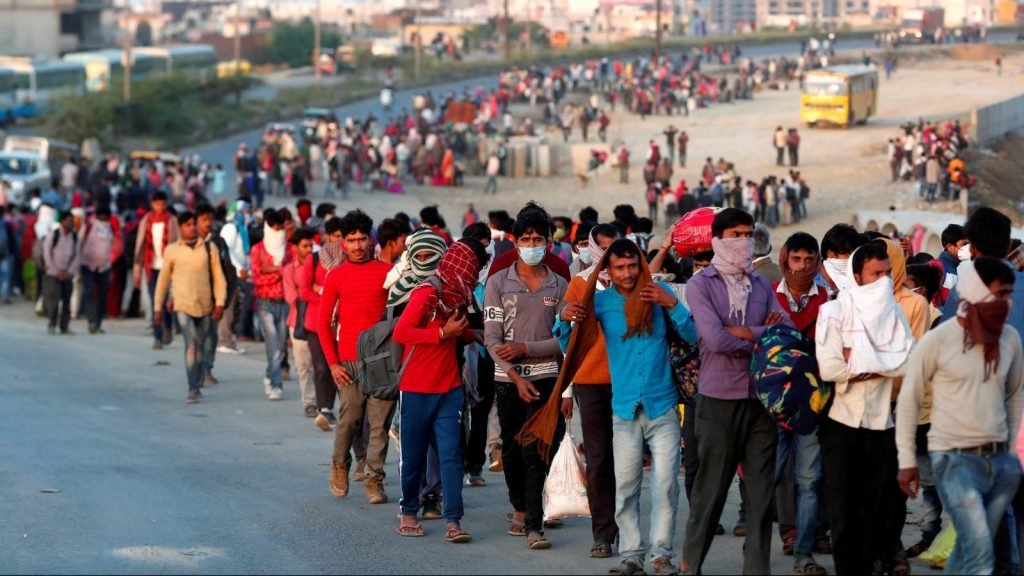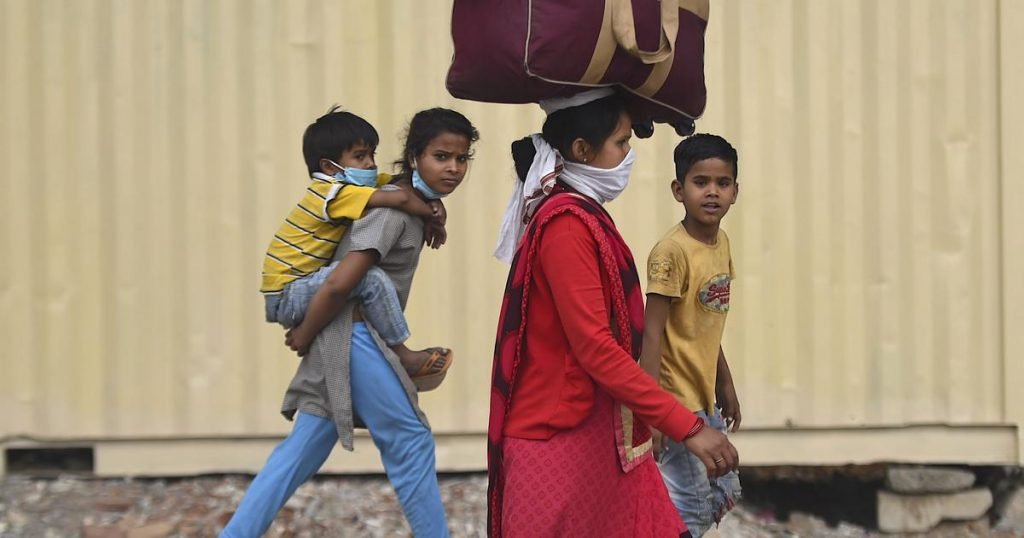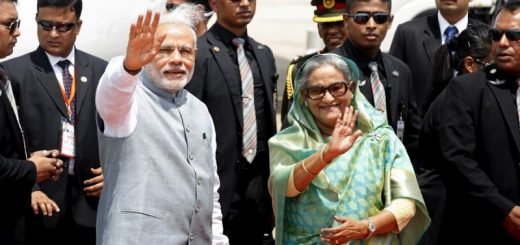COVID – 19 and Internal Migration in India

COVID- 19, the recent pandemic has caused chaos across the world, claiming thousands of lives and leaving many distraught. The deadly virus originated from the wet market of Wuhan affecting Europe, the United States, Southeast Asia and causing havoc in the African countries. Every country is fighting against the virus in its own way, but it lays a huge burden on the developing countries like India, which are already fighting against poverty, high unemployment rate, increasing population growth etc. India, being a developing country has thousands of migrants that move from one state to another in search of better job opportunities and living conditions. According to the economic survey of 2016-17, there are around 9 million people migrating within India. The unforeseen and unanticipated movement of migrant labour has had a profound repercussion after the announcement of 21 days lockdown by Prime minister Narendra Modi. India, like various other developing countries, has had an extensive history of internal migration. The two distinct and visible migration patterns after the independence and therefore at the onset, the migration was forced because of the partition. The other kind of migration was directed by speedy industrialization, better job opportunities and living conditions. Cities like Mumbai, Delhi and Kolkata receive the highest number of migrants.
The spread of COVID-19 has made these migrant labourers realize that “distance” is significant and that some of these workers that left their towns and farms may never want to come back to the metropolitan cities. These migrants will prefer to earn a little less from their farming and stay close to their families. There is a large overflow of migrants from places like Bihar, Uttar Pradesh, Assam, Bengal etc. the unexpected 21 days lockdown and the following closure of transportation has left the migrants petrified and frenzied in various states as these workers lined up on the highway to walk back to their homes. The sudden shutdown of transport services has left workers with no time and way to go home. Some of the migrants have forced themselves into trucks and overloaded buses.
After seeing the plight of these workers, many people argue that India did not extend any proper assistance to these migrants that is in complete contradiction of the conduct towards the Indian citizens stuck in a foreign land, who have been brought back to India from all around the world. A migrant worker who was working in Delhi decided to walk home and travel 800km to Madhya Pradesh but unfortunately, he died due to a heart attack. After witnessing such incidents, the government pleaded to the migrant workers to stay where they are and promised to provide them with essential things needed for their survival.

According to the economic survey of 2017, there were nearly 139 million internal migrants, which depicts the number of workers affected by the lockdown. At the beginning of the lockdown, the Indian media focused mainly on the migrant workers feeling back home due to the shutdown of their workplaces but as the days pass the major focus is laid upon reverse migration and while everyone in the country are staying at their homes and are safe, these migrants are left alone to deal with the crisis. The question that needs to be asked is whether who is responsible for helping these workers in their plight? India is a democratic country and labor is a subject in the concurrent list and it contains 52 items one of which is labor which means that both the union and the state government can review it. The interstate migrants’ workmen act of 1979 remains an act that was not implemented like it was envisaged. The act has a lot of provisions that might have scoured and protected the migrant laborers if implemented congruously but the poor administration of this act has caused a huge hindrance in the safety of the migrant laborers. The Indian media has always lambasted the labor laws of our country to be way more compounded, obsolete and obstinate.

The current 21 days lockdown and its further extension has left the migrants in an extremely uncertain situation. Since the virus is presumed to be an urban issue that was ushered into India by the more prerogative migrant workers and therefore the villages are regarded as a safer haven than the cities. This has also been regarded as a conjuncture of why the vagrant laborers are hellbent on returning home and they also fear that they might never get a chance to go home if they contract COVID 19. The supreme court on the 31st March, ordered the state governments to provide the vagrant labors with food and shelter. The migrants that have found out to be positive with the virus have been facing social prejudice and intolerance. In a graphic example, migrants were doused in disinfestations by the police which is in complete contrast to the treatment given to the Punjabi international migrants that were one of the first bearer of COVID 19 but have been permitted to go back to their villages and contravene with the course of action guided by the Prime Minister.
Internal migration is referred to as a problem in India and the decision of the supreme court for the state government to provide the migrants with food and shelter which indicates that migrant laborers are regarded as poor and an economic problem. Migrant laborers were reflected as an economic burden and treated under schemes like MGNREGA. This scheme lays out that internal migration appears to be evolved due to low level of development in their states. Therefore, this reflects how the Indian government has overlooked the fact that there can be various social, economical and cultural aspects of migrating. The approach towards the recent migration situation could have been more consolidated where the migrants could be placed in temporary shelter and not left on the roads to find their way back home. The migrant laborers who pose no risk of spreading the virus should be allowed to go home, these recommendations do not circle around economic assistance but asserts that the government needs to swell into a extensive and profound understanding of migrant laborers and their necessities.

Many people believe that due to the recent privation and penury of the lockdown, the migrant labor will go through mental illness. Even though the Prime minister appealed to the laborers and expressed his regret for the sudden lockdown, the migrants are left with nothing but the desire to return home. According to Yamini Aiyar, who is the head of the Center for policy research, the Indian government has put the responsibility and encumbrance of well being and health on the citizens rather than the state government. A lot of interstate migrants have left their villages due to climate changes but once they go back to their villages after the lock down, they will have to face the same hardship again. More than half of Indian population is worried about the essential element that is food and eventually if the situation of the spread of coronavirus is contained, many of these poor people will suffer from lack of food and nutrition. There have been many instances both in China and Italy that reflect the increase in the spread of the virus due to reverse migration. Innumerable of these migrants already suffer from grave disease like Tuberculosis, Malaria etc.
Out of all the migrants there is a large pool of laborers that rely on daily remuneration to survive. Even though the Indian government has proposed an emergency fund for USD 22.5 billion to help citizens, many fear that this amount will not be enough to assist everyone. A worker that earned rupees 5000 per day now earns 500 now, which will eventually give him mental stress since he will not be able to provide for his family. A researcher from the department of public health science asserts that since India is a country with various disempowered groups working away from home in all states of India. The article “Transnationalism- A new analytic framework for understanding migration” gives an insight into the underlying issue that arises when individuals are away from their families. Transnational migration refers to the movement and settlement of people across internal borders, where they develop a social, economic, cultural and political relationship with the new country and remain connected to their homeland. Although transnational migration is an international phenomenon, one can connect it to the current events in India. The lockdown has resulted in keeping the migrant workers away from their homes in various states across India that has created a certain level of uncertainty in the lives of the workers.

One of the basic characteristics of transnational families is that they live apart from each other for most of the time but try to stay connected as a family. The laborers who are away from their families have been under great pressure to return home since many of them are the sole breadwinners of the family and after the lockdown they are unable to send back money to their families leaving them in distress. For example, there are many migrants’ workers who travel from Nepal that are unable to go back because the borders are sealed, and Many believe that this will further heighten the unrest in the country. The labors will be in desperate need to earn and might act against the law. We cannot deny the fact that Muslims are one of the most impuissant majority in India and it is believed that PM Narendra Modi has been distinctively invidious against Muslims after he passed the CAA act. The passing of the act created chaos across India especially in India and resulted in a huge protest in Shaheen Bagh and even though the protests were put to an end because of the lockdown, many people lost their lives. The inequality towards the Muslims is also evident in the COVID 19 situation. Even though the number of people affected with COVID 19 has increased tremendously after the Jamaat incidents, hashtags like Corona Jihadis are intolerable and offensive. This discrimination against the Muslim community and not towards the actual perpetrators has resulted in the shift of Islamophobia to be substituted with coronavirus.
The sudden 21 days lockdown has created a scenario of financial emergency in India with significant socio-economic consequences. Some might feel that the decision of a lockdown is pivotal in controlling the spread of COVID-19 whereas one cannot overlook the reality that in situations like these guaranteeing the supply of essential things is very crucial. The United Nations high commissioner for human rights expressed that the lockdown will amount to a huge logistical and administrative predicament considering the huge population of India. This sudden lockdown stimulated the mass movement of thousands of migrants that took the lives of innocent people. After witnessing the trauma of the migrant workers, it seems as if the Indian government has left them impuissant and wrecked. This also delineates the response towards internal migrants and with the sudden lockdown and the migrants trying to flee back home, the main aim of the government is to provide them with daily essentials rather than considering the fact that like everyone else in the country all they desire is to unite with their families. India appears to be unprepared and unwary of the migrant situation including the cumbersome response of the state government that has resulted from the consideration of what these labors necessitate and require.

The Indian government should work towards increasing the testing of the virus so that no more people lose their lives to it. The migrant labour should be aided by the government to return to their families safely rather than being forced to walk thousands of kilometers. The suggestions do not harbinger the need of monetary assistance but lays emphasis on the importance of understanding the needs of the helpless migrant workers. India, a developing country is already facing various challenges like poor infrastructure, unemployment and substandard medical facilities and therefore the only modus operandi that will help India in the COVID-19 situation will be the cooperation and teamwork of the Indian government and the citizens.


















